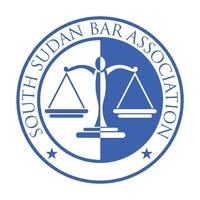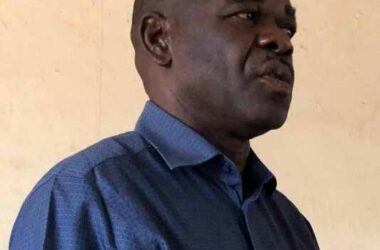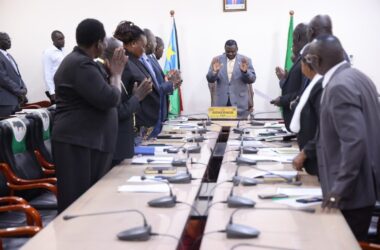By Kei Emmanuel Duku
As South Sudan joins the global to commemorate International World Press Freedom Day, media practitioners cite impediment of media freedom in the country.
Removal of articles from newspapers, arrests, intimidation, illegal detention, and torture of journalists, significantly interfere with media freedom
Majak Kuany Alier, the Secretary General of the Union of Journalists in South Sudan, stated that media outlets sometimes encounter direct editorial interference from government authorities who threaten shutdowns, often accusing media houses of political instigation.
The Union Secretary noted that journalists across the nation have experienced discrimination and harassment while performing their duties and have also been denied access to information by those in positions of authority.
Kuany explained that despite the existence of free media laws, such as the Access to Information Act, the Media Authority Act, and other pertinent legislation, weak legal and institutional protection systems continue to hinder freedom of expression.
“We have a lot to confront, including journalists who have been intimidated or arrested. Accessing information remains a significant challenge for us to effectively carry out our work. We need public interest information to be broadcast or disseminated to the public; unfortunately, it is difficult to obtain,” Kuany stated.
According to the Union of Journalists in South Sudan, in the past four months, four journalists have been subjected to arrest and detention. Among these four, three were released without charges, while Emmanuel Manchol, the Editor-in-Chief of Dawn Newspaper, remains in detention in Juba.
Several journalists across the country have faced harassment and arrest, including Alhadi Awari, a broadcast journalist with Eye Radio; David Night, a journalist based in Maridi, Western Equatoria State; and Adil Faris.
Kuany pointed out a contradiction within the National Security Act, specifically Articles 53, 54, and 55, which grant national security officers the authority to arrest individuals with or without an arrest warrant.
He argued that this creates an unconducive working environment for journalists.
“Several journalists have been intimidated, some even slapped during press conferences, indicating a lack of due respect. Arbitrary detention is common, and journalists need to be treated with dignity. Ensuring the safety of journalists is not solely the responsibility of the army, police, judiciary, or national security; building a stronger community that supports journalists is crucial for their protection,” he added.
Sheila Poni, a freelance journalist, stated that in South Sudan, press freedom is not just under pressure but is frequently under attack.
She added that journalists in the country operate in fear, facing threats, censorship, and rejection from those in power who resist scrutiny yet desire amplification of their voices, even though many wish their messages to reach the public.
“Access to basic information is a battle. If the government and institutions do not provide journalists with the space to do their jobs, how can citizens trust the information they receive?” she questioned.
Four months prior, Poni worked as a broadcast journalist for Voice of America (VOA) before the United States of America’s President, Donald Trump, issued an executive order suspending its operations in 135 countries, including South Sudan.
She emphasized that VOA is globally recognized for its accurate and balanced content, and that shutting down Voice of America is not merely closing stations but also closing windows to the truth for millions who rely on it.
“The world deserves better, to meet the needs of its people. To the public, I urge you to support us and defend the freedom that underpins all other freedoms. And to those in power, open your doors. The media is not your enemy. Silence offers no ease,” Poni added.
Despite facing underpayment, working in a risky environment, and constant intimidation from security forces and those in power, she appealed to fellow journalists to report objectively and urged the government to foster an environment of dialogue, not fear, and to open up institutions, not shut them down.
She also called for the protection of journalists, not only for their own sake but for the benefit of a free, more informed, and more democratic society.
Meanwhile, Alhadi Awari, a broadcast journalist working for Eye Radio, a subsidiary of Eye Media, stated that he has faced numerous threats while reporting, with the most recent occurring at the beginning of this year.
Awari noted that this year’s World Press Freedom Day holds particular relevance for South Sudan because press freedom remains severely limited, and journalists face significant threats to their safety, independence, and access to information, largely due to the limited recourse available to journalists facing legal persecution or violence.
He appealed to the government to establish strong institutions that would hold perpetrators accountable for crimes committed against journalists.
“I have been severely harassed, and to address this, our leaders must support accountability. Build robust systems for oversight, redress, and responsibility when leaders err,” Awari stated.
Commenting on the censorship and removal of news articles from the printing press by security agencies, Kiden Stela Mandela, Editor-in-Chief of No.1 Citizen Newspaper, emphasized the importance of reaffirming the universal commitment to freedom of expression and press freedom.
She noted that these actions affect media diversity and independence, as well as the creation and dissemination of news and media content by media outlets.
She urged the government not to view journalists as criminals but to consistently respect their work.
She also called for an end to the intimidation of media content creators through the removal of articles, advocating instead for responses or arrests with warrants, followed by presentation in court.




